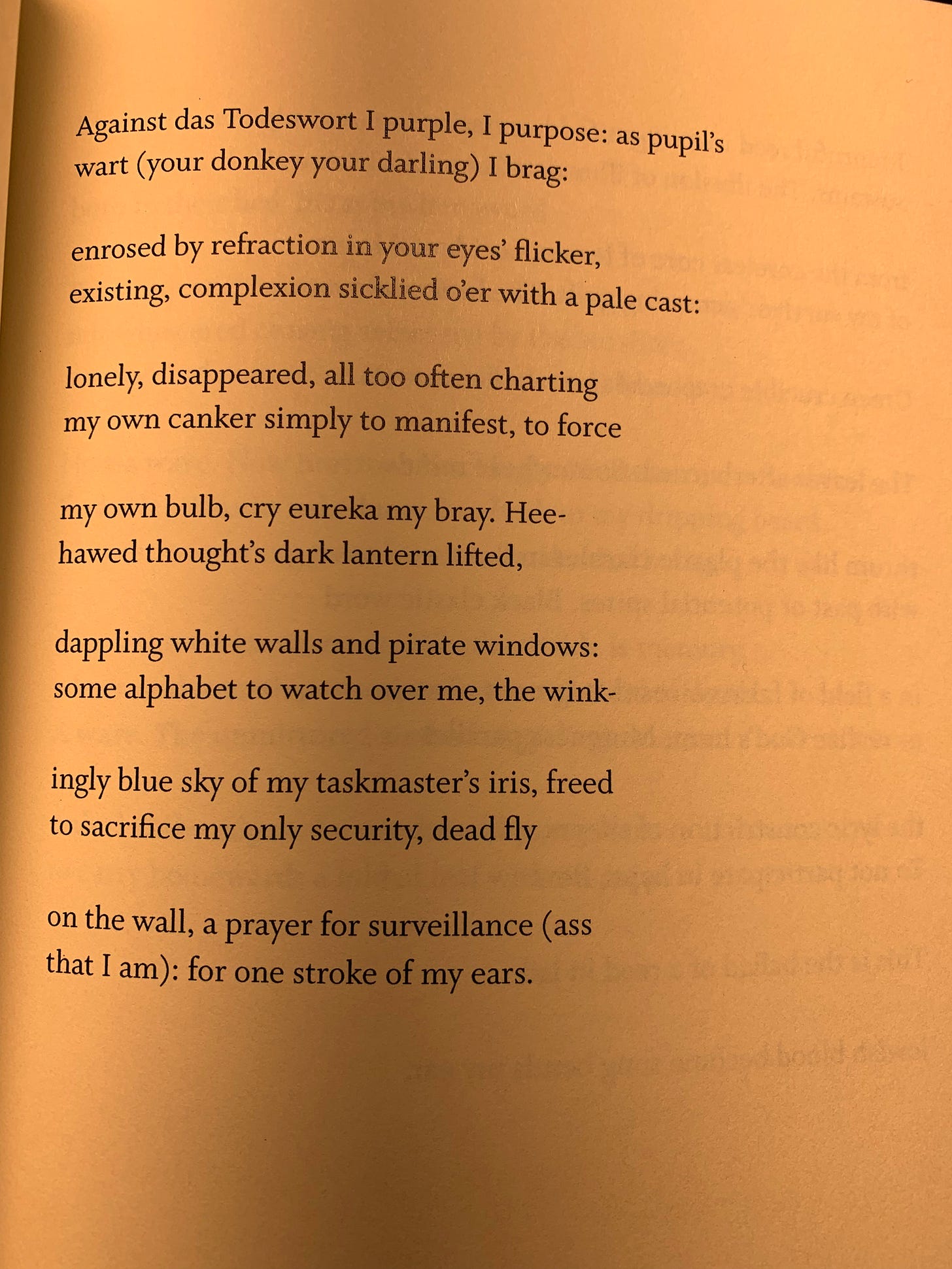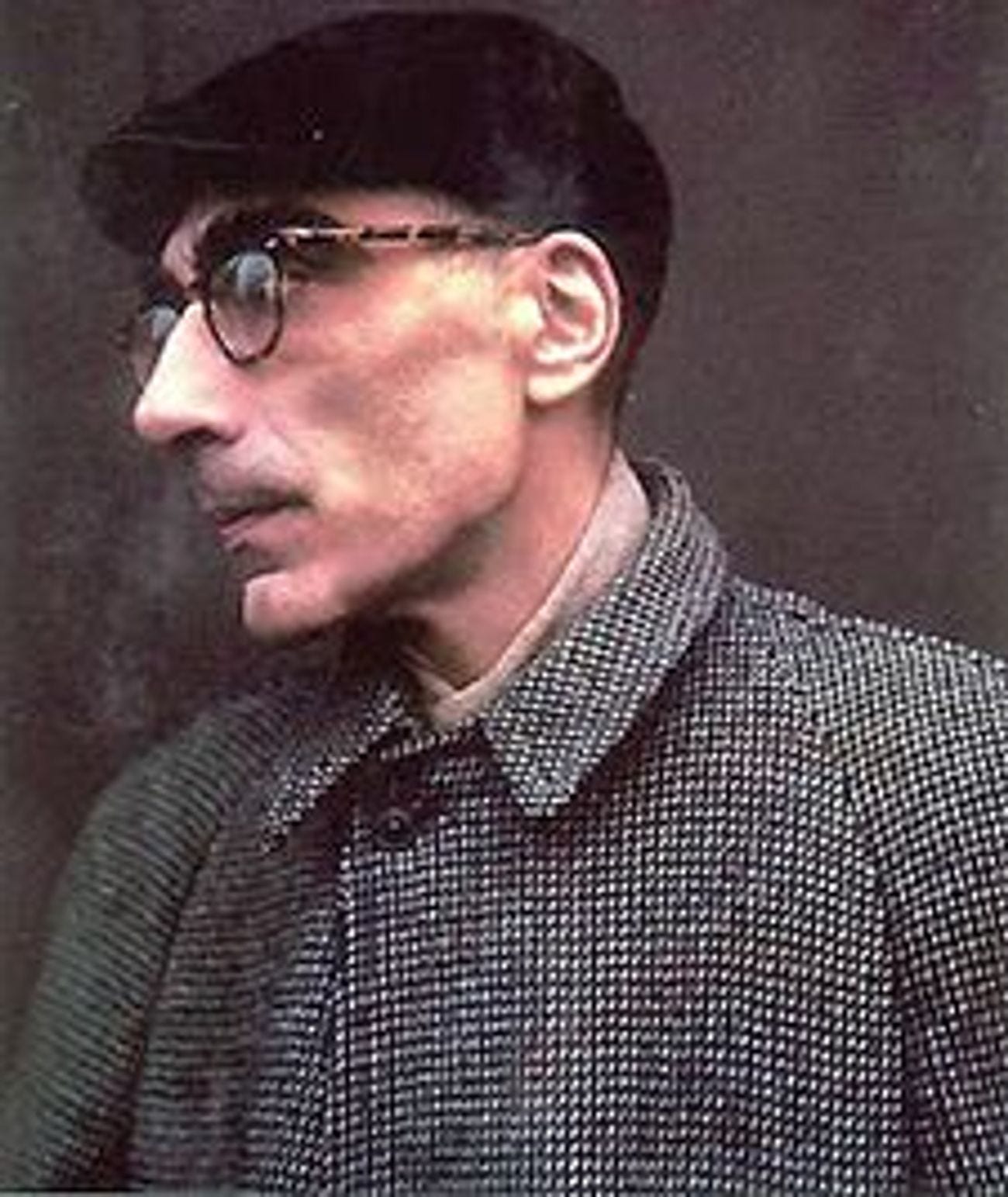Loving the little words
The spirit of 9/12
The arbitrariness of dates, and fates. The terrible imperative to assume responsibility for the world as you find it, as it happens to you, as you happen in it. I think back to the wrong turns, the hanging chads, the missed clues. The day before, the day after. Twenty years of adult life. A hole whistling out of my protracted adolescence. A hole full of smoke.
After it happened, I mean right after, I fell in love. I wrote a book about the strangeness of this. The weird persistent daily ecstasy of the ordinary transformative in a morally disastrous time.
It’s been a long time since I looked at these poems. They’re poems. They don’t have any wisdom to offer and they don’t offer direct statements or expressions of ideas or even feelings. They swim through the language and emerge speaking themselves. I don’t know where I learned that it was safest to speak in a kind of code, or how I came to believe that it was necessary to speak that way. My poems demand intimacy with one hand and ward it away with the other. Maybe it’s just that--that sequence of gestures--that means something.
There’s one poem in the book that references the event directly:
While I was writing Severance Songs I was also writing a dissertation, one chapter of which was devoted to the wildly hermetic American poet Louis Zukofsky. In a 1946 essay, “Poetry / For My Son When He Can Read” (the son in question, Paul, was then three years old), he wrote:
The poet wonders why so many today have raised up the word “myth,” finding the lack of so-called “myths” in our time a crisis the poet must overcome or die from, as it were, having become too radioactive, when instead a case can be made out for the poet giving some of his life to the use of the words the and a: both of which are weighted with as much epos and historical destiny as one man can perhaps resolve. Those who do not believe this are too sure that the little words mean nothing among so many other words.
The word “radioactive” leaps out at us: Zukofsky was writing from the dawn of the nuclear terror, just a year after Hiroshima and Nagasaki, and in the wake of the death camps. “Myth” here is shorthand for the will to public meaning, public sentimentality, the plug for the hole in things so anxiously sought by Zukofsky’s modernist mentors, the anti-Semitic T.S. Eliot and the outright fascist Ezra Pound. Against what we might call “big myth,” akin to and and outgrowth of the “big science” that produced the Bomb, Zukofsky proposes language at the finest points of its articulation, “the words the and a.” Having written, of course, an exquisite parody of The Waste Land titled “Poem Beginning ‘The’”; and being at that time, 1946, more or less midway through what he would call his “poem of a life,” “A”.
My sonnet lacks the fanatical attention to music paid by Zukofsky but it does give some attention to the little words beloved of Zuk and the other “Objectivists,” ending with a falling man’s leap into nothingness, with a bitter floating “to” that stands opposed to “the language of my polis incorporating fire.” To the way George W. Bush and his lackeys seized upon the spectacle conjured by criminals and turned it into a twisted national symbol, a license to rain destruction upon the innocent and to leave in tatters whatever shreds of idealism it might yet be possible to associate with the American flag that, for a week or two only after the attacks, aroused in me an emotion it never had before and never has since: a tenderness, a fragility, a sensation precisely opposed to the myth of individualism that in its parodic and steroidal form has become a direct threat to the life and well-being of me and everyone I know and everyone yet to be born.
I love the prepositions: to, from, for, at, by, upon, above, below…. Their voluptuousness was first made apparent to me reading Donne’s dead-sexy “To His Mistress Going to Bed”: “Licence my roving hands, and let them go, / Before, behind, between, above, below.” Most of all I love of, how it attaches things to each other without insisting on possession, but bleeds the space between them, so that they participate in each other: “the plays of Shakespeare” binds the two nouns more fluidly and actively, so that we recognize how much the identity of the one depends upon the identity of the other, far more than “Shakespeare’s plays.” Of course it rhymes with love. I tried to capture this in a poem--like so many of the poems in that book addressed to and for and with the woman who would become my wife.
The “epos and historical destiny” of of asserted against the awful myth of innocence, the terror of mortality and interdependence that Americans lash out against in psychotic ways, with bombs and drones and school shootings and refusing to get vaccinated or wear a goddamn mask. We don’t wanna grow up, and it is costing us, and the rest of the world, more and more every day.
The last poem in the book was written months or years after the others, after my daughter was born:
Shelley: “And whether it spreads its own figured curtain, or withdraws life’s dark veil from before the scene of things, it equally creates for us a being within our being. It makes us the inhabitants of a world to which the familiar world is a chaos. It reproduces the common universe of which we are portions and percipients, and it purges from our inward sight the film of familiarity which obscures from us the wonder of our being.”
Poetry constitutes a sort of retreat from the world that is too much with us that nevertheless brings the world with it; you return from that space bearing language that tries to dramatize just that action: retreat and return, “a being within our being.” It’s a method for binding thinking with feeling, carrying the strain--”the defects of a record of struggle” as Pound said of The Cantos. Poems insist on difficulties most of us would rather evade. We say “poetry” and we mean perfection--the “poetry in motion” of an athlete, as the cliche has it--forgetting that poems, real poems, sit with the imperfection of aliveness. “Poetry,” with its mythic gestures toward immortality or the transcendent or whatever, is undead in our time, a brain-devouring zombie. But reading a particular poem calls us to our finitude, our mortality, our imperfection.
Shelley rhapsodizes about “the wonder of our being,” but the prerequisite for wonder is humility and our recognition of “the common universe of which we are portions and percipients.”
There have been many blind alleys, many disastrous turns. Brightness falls from the air. But we’re here, of our time.
Let us not rehearse the day, but learn from it.
We must kill its emblem if we can.








